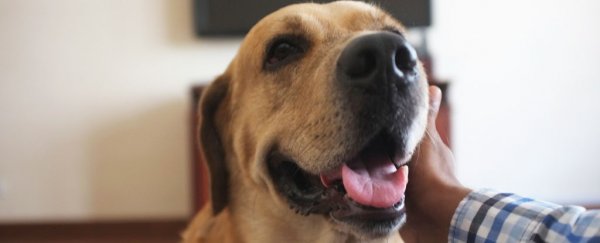The next time you want to treat your pooch, you might want to consider giving it some kind words rather than a snack, because new research suggests that many dogs would rather get our praise than our prosciutto.
The first-of-its-kind study mixed brain-imaging data from canines with a series of behavioural experiments, and came to the conclusion that dogs really do value the relationships they have with their owners. In other words, we're not just a means to get food.
"We are trying to understand the basis of the dog-human bond and whether it's mainly about food, or about the relationship itself," said neuroscientist Gregory Berns from Emory University.
Berns' team studied 15 dogs, with each animal being monitored through almost 100 separate trials. Only two of the dogs were found to clearly prefer food over praise from their owners, with the other 13 either preferring praise or appearing to like both equally.
To get an idea of what kind of owner behaviour the dogs were most interested in, the researchers trained the dogs to associate three different objects with three different outcomes: a pink toy truck meant a food reward, a blue toy knight represented verbal praise from the owner, and a hairbrush acted as a control object that signified no reward at all.
Neural activity was recorded using an fMRI machine as the dogs were tested on each of the three objects. Four dogs showed stronger neural activation for praise, compared with just two dogs that showed a stronger stimulus for food, while in the nine others, the levels were around the same for both.
Next, the dogs were shown around a Y-shaped maze, with one path leading to a bowl of food, and the other leading to the dog's owner (facing away from the dog). The dogs that showed a stronger response to praise in the first experiment also chose to go to their owners instead of the food 80 to 90 percent of the time in this second test.
According to the researchers, the results suggest that the stronger neural stimulus spotted on the brain scans does affect the way the dogs will behave.
Academics have been trying to figure out 'man's best friend' for a century at least: right at the start of the 1900s, Ivan Pavlov found that dogs 'learned' to start salivating when their owners (and the possibility of food) appeared, rather than just at the sight of the food itself.
That in turn gave rise to the idea of classical conditioning as a way in which animals can learn to connect certain objects and people with certain consequences. But the relationship between people and dogs might not be as clear-cut as Pavlov thought.
"One theory about dogs is that they are primarily Pavlovian machines: they just want food and their owners are simply the means to get it," said Berns. "Another, more current, view of their behaviour is that dogs value human contact in and of itself."
It's worth pointing out that Berns' study is definitely on the small side, with only 15 animals taking part.
But until there's further research with a bigger pool of animals, as dog lovers, we'll take any evidence we can get that our canine companions really do care about interaction just as much (if not more) as where their next meal's coming from.
The findings are published in Social Cognitive and Affective Neuroscience.
